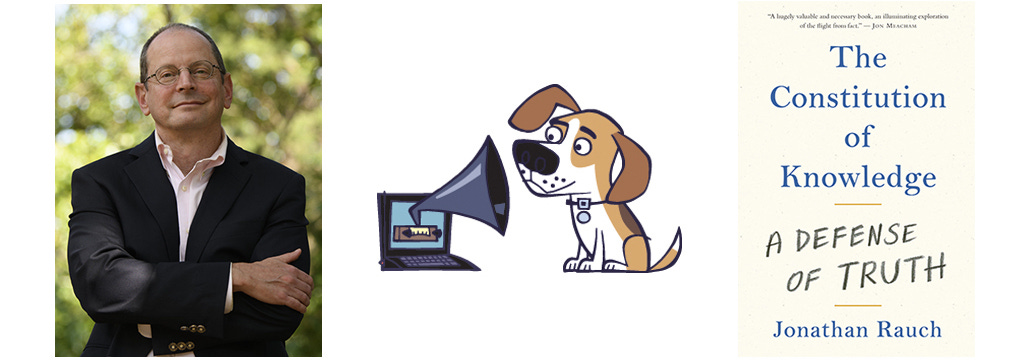Transcript: Jonathan Rauch On Dangers To Liberalism
His latest book defends the Enlightenment against the Trump assault and creeping wokeism.
Jon and I go way back to the early days of the marriage movement. In this episode we discuss his important new book, The Constitution of Knowledge, and get into some heated exchanges over Trump, the MSM, and Russiagate — Jon as the optimistic liberal and me as the pessimistic conservative.
The episode aired on June 4, 2021, and you can listen to it here. Below are some money quotes from Rauch:
“Critical race theory is not going to make a coronavirus vaccine. It’s probably not going to solve much of anything, right? If you want solutions, and if you want peace, and if you want civility, and if you want knowledge, that’s what we offer.”
“Knowledge doesn’t come from certainty, it comes from doubt. We can all be wrong at any given time.”
“Pluralism is really the only path to a peaceful productive and knowledgeable society. What the purists have is only eternal warfare, in which arguments are not resolved and the casualties are either physical human bodies, or ostracism, or ignorance, or chilling.”
“We do have to accept the legitimacy of a system in which our side can lose but we move on to the next battle, the next argument.”
Andrew: Hello and welcome to another Dishcast, this time with the great and powerful Jonathan Rauch.
That's how Joe Rogan introduces: Everybody's great and powerful. But actually Jon is great and powerful. We've known each other for most of our adult lives, I would say.
Jonathan: Thirty years now, since you recruited me to write for The New Republic.
Andrew: We've gone through our lives together, both as writers in the sort of broad old-school liberal or conservative sense, although you're not a conservative in ways that I am. Also as homos. When I met you, you were just beginning to come to terms with that, and you've flourished and bloomed ever since.
Jonathan: Well, I had been out, but your role was to say, "Come write openly gay for The New Republic." You made that possible, you encouraged it. I had a council of war with my friends and said, "You know, once I do this, I can never undo it." And it was 1991 and I did it and I've never looked back. I still owe you for that, dragging me out into the public prints.
Andrew: Well, I invited you out. I didn't force you to do anything you didn't want to do.
Jonathan: An invitation from Andrew Sullivan can be quite compelling.
Andrew: Well, on the other hand, extremely dangerous. Be careful. [laughs] I remember that happening really when I wrote the first piece for the case for gay marriage, “Here Comes the Groom,” as Kinsley called it. That too was like, "Well, that's it, I'm done now."
Even though I was out to my friends, to be that publicly out was a step. I remember the first time I used the word "we" — it's interesting how pronouns can be significant — was in the Gay Life, Gay Death piece, which was a year later.
Jonathan: My father warned me. In 1995 I told him I was going to write a piece for The New Republic on gay marriage. You put it on the cover. It was your last cover, I think, before you left. He begged me not to do that. Not because he was homophobic or even anti same-sex marriage, but he said it would destroy my career. After that no one would take me seriously because the idea was so ludicrous. And at the time that seemed very possible.
Andrew: My mother, the same. I remember what she said about Virtually Normal. She said, "Well, that's very nice but I'd love you to write a real book soon." And I said, "What do you mean a real book?" "You know, one that uses your scholarship and isn't one of those topics." And that's how my some of my family responded to it too.
Jonathan: Well, we were pleading for special rights, as you recall.
Andrew: Yeah. Well, she just wanted, like your dad … she thought basically my career would be over. We were the first generation to really be out from the get-go.
Jonathan: Yeah, and be out in ways that displeased the activists who at that point were running the movement, and now are running it again. But I suppose that's another podcast.
Andrew: It is, although we might get to it in this, because what we're talking about today is Jon's new book, which I have just finished reading, which is called The Constitution of Knowledge: A Defense of Truth. I have to say that I found it very helpful to me, even though I know a lot of this already. It's not like we haven't talked or thought about these issues over a long period of time and share roughly the same perspective.
What Jon has done in this book is really systematically explain liberalism, in its Anglo-American form over the last 200 or 300 years. Even its origins in the religious wars in Europe and how it evolved — and its strengths. This is not an affirmative description of what truth is. It's more a description of the way in which we can provisionally believe something is true until we find out it isn't, or we find out that there's a nuance to it.
So, start off with this, the essence of liberalism, the key principles of it. One of the key principles is that it's a collective thing and requires certain disciplines and certain principles. Lay them out for us.
Keep reading with a 7-day free trial
Subscribe to The Weekly Dish to keep reading this post and get 7 days of free access to the full post archives.


